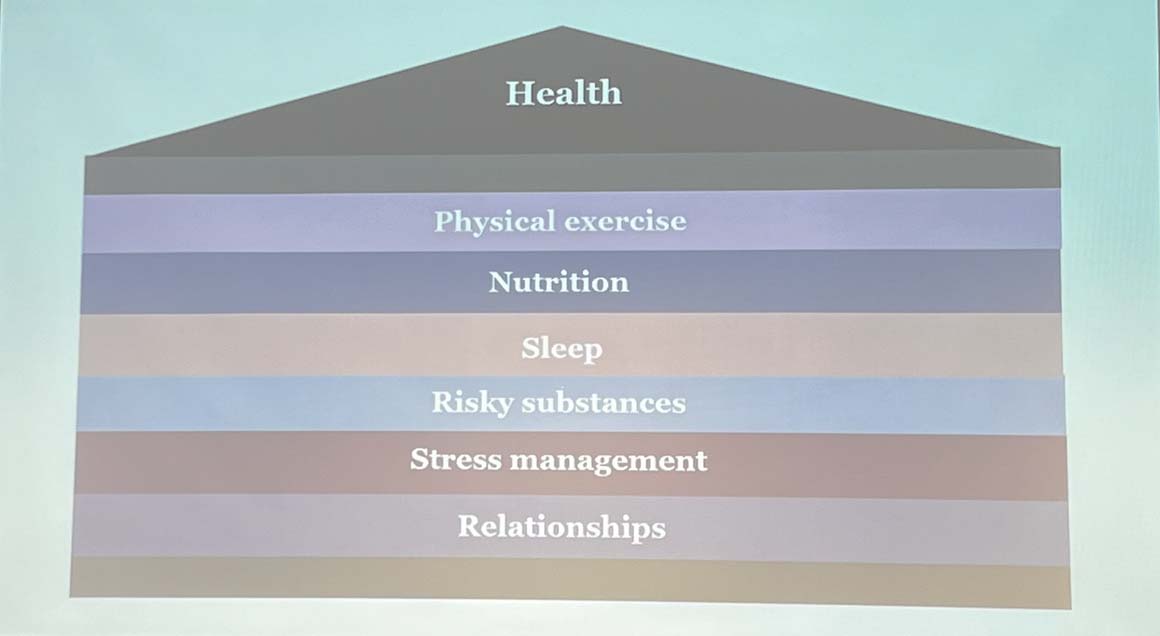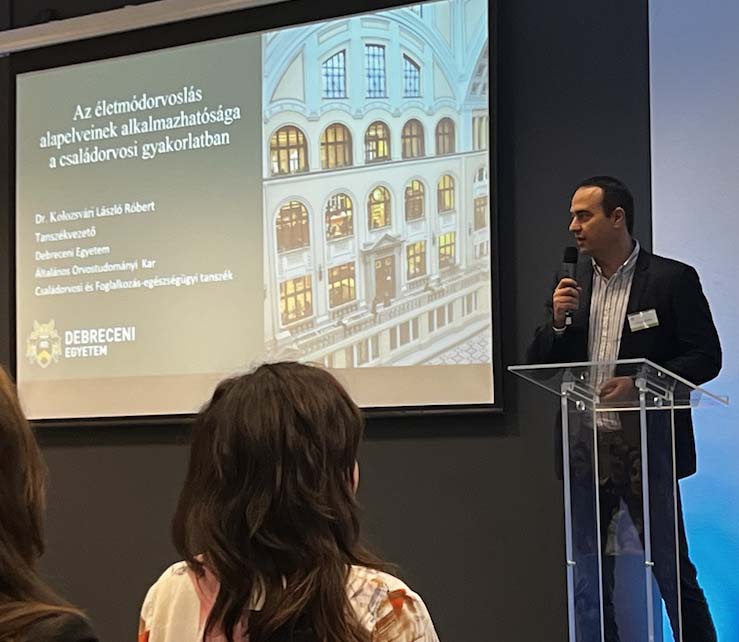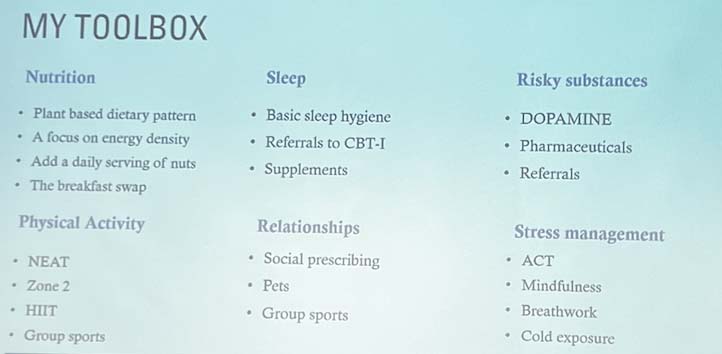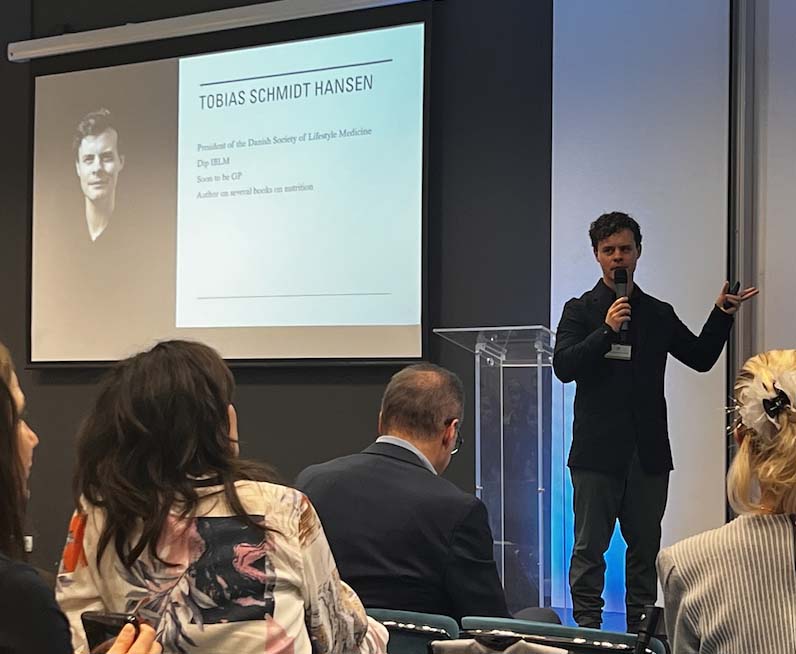
High quality presentations at the 1st MOTE Congress
The 1st Congress of MOTE was sold out and even oversubscribed, with a series of high quality professional presentations.
What is MOTE?
The Hungarian Association for Health Maintenance and Lifestyle Medicine (MOTE) was founded in the spring of 2021 with the aim of making the latest evidence available in Hungarian as a domestic health organisation in cooperation with its American sister organisation, in these times of increasing chronic disease worldwide. Its members are doctors, dieticians and herbal nutritionists who recognise that inappropriate diet and lifestyle are behind most illnesses and deaths, and see that conventional medicine cannot reduce the number of patients, and that the number of patients is increasing and at younger and younger ages. They see the solution as not only treating patients symptomatically, but also curing them through lifestyle changes, alongside the necessary drug and other therapies, thus expanding and completing the traditional medical model.
MOTE held its 1st two-day congress in December 2023. Dr. Tímea Csépes, Board member, told us about the aims of the initiative and future plans:
Our primary goal was to educate colleagues and lay people about the pillars of good lifestyle and that lifestyle medicine does have a place in Western medicine. Colleagues tend to overlook recommendations for lifestyle change because they do not think patients are willing to change. Our aim was to bring together a team of speakers who would go through all the pillars to show how to get started and what results can be achieved through lifestyle change.
“Our other goal was to make it possible to take the international lifestyle medicine exam in Hungarian at home. One of the requirements for the exam is that candidates must have attended at least 10 hours of a congress relevant to the topic. This was the first time that candidates were able to complete the 10 hours of attendance in Hungary and the congress venue was also the venue for the examination.
The maximum number of participants at the congress was planned to be around 80-100, but 187 registrations were received. This was a very good feedback for us to see how many people are interested in this topic. We are satisfied and feel that we have organised a high-quality congress.”
Dr. Tímea Csépes, MOTE Board Member
We prepared a summary of the congress from the point of view of plant foods and plant-based nutrition. Our article is based on a report by Dóra Pintér.
6 lifestyle pillars
The technical presentations covered the 6 pillars of lifestyle (Nutrition, Addictions, Physical Activity, Social Relationships, Sleep and Stress Management), but also practical guidance (workshops) and personal experiences. Alongside these, in other sessions, anyone who wanted could do yoga or learn mindfulness in practice. Two of the most prominent American practitioners of lifestyle medicine, Dr. Dean Ornish and Dr. Michael Klaper, addressed the audience via live announcements.

We have included a short summary of each of the presentations.
Pillar 1: Nutrition / Why a plant-based diet?
Dr. Zoltán Szabó Phd (sports dietician, associate professor)
For those of you familiar with Dr. Zoltán Szabó’s lectures, this time it was in classic form. He presented to his medical colleagues the most important nutritional risk factors (alcohol, high salt intake, low intake of whole grains, fruits, oilseeds, vegetables) that make it important to eat more plant-based foods. He described the role of plant-based diets in prevention, including what studies have shown to protect against diseases. He also talked about the real “pitfalls” of the diet.
We can extend our lives by up to 10 years by eating more plant-based foods, less meat products and less sugar. Those who start making changes at the age of 80 can also gain an average of 3.4 years of life.
Pillar 2: The importance of exercise
Rebecca Deutsch (US-based personal trainer and manager of the American Society for Lifestyle Medicine)
She basically talked about the importance of exercise through her own life story, but there was no getting around the importance of nutrition, how much a plant-based diet has made a difference in helping you get in the best shape. She highlighted alcohol consumption as a risk, which can significantly impair athletic performance. She also highlighted the positive effects of exercise on anxiety.
Pillar 3: Sleep, Sleep culture, Lifestyle
György G. Németh (Associate Professor, Director of Benyovszky Medical Centre)
Sleep is a very important and sensitive lifestyle area. Many people have difficulty falling asleep or waking up at night, which affects their health. Since COVID, the number of sleep problems (especially nightmares) has increased significantly. The director, an associate professor, said that there are 120 types of sleep disorders in total.
How we wake up in the morning determines our whole day. The mattress we sleep on is important (men and women need different mattresses in bed), as well as the ideal humidity and temperature in the room (around 18-20°C).
Pillar 4: Treatment of addictions
Dr. Máté Kapitány-Fövény Phd (clinical psychologist)
Has been working with addicts for more than ten years, both in the field of therapeutic care and addiction research. He also leads the development of innovative play-based prevention programmes. He has formulated the nature of addiction as follows: “When one becomes disillusioned with values, one escapes into pleasure.”
In addition to classic addictions (alcohol, cigarettes, drugs), he also spoke about digital addiction. At first glance, you wouldn’t think it, but this topic is also linked to healthy eating, because with addiction people are filling a gap. When they feel alone, they tend to self-stimulate and choose an addictive substance, but they also tend to overeat or watch TV while eating.
Pillar 5: Social relationships and health
Dr. Katalin Piczkó (Psychiatrist, relationship expert, trainer, coach, developer of the Garden of Love programme)
This lifestyle pillar has been ranked first and foremost by many, as relationships and attachment are the source of life. There is a close connection between our thoughts, feelings and the material world. An important question for every human being is what to do with the ‘inner child’ and ‘inner critic’ within him or her. Everybody is looking for the experience of unity, that’s what we long for, that’s what heals us. Our relationship with our mother is the most decisive in this, our relationship with her also affects our relationships with our partners.
Pillar 6: The importance of emotional well-being, ways to manage stress
Dr. Barbara Szentgyörgyi (Holistic GP, qualified lifestyle doctor, President of MOTE)
Feelings of loneliness significantly impair quality of life, health and also reduce the length of life. A meta-analysis based on 148 studies found that the adverse health effects of social isolation are equivalent to the harm of 15 cigarettes a day. It is more harmful in terms of mortality than obesity, physical inactivity or regular alcohol consumption.
According to the expert, the main options for stress management are:
- Meditation, Relaxation, Mindfulness
- Mindfulness, Meditation, Mindfulness, Mindfulness, Sleep, Healthy Eating
- Exercise, Nature walks
- Nutrition, Health, Nutrition, Healthy eating, Nutrition, Healthy exercise, Playing, Dancing, Hobbies
- Social Connections
Lectures in the specialist areas
It is also worth mentioning some of the presentations from the specialist areas, since the plant-based diet represented by NÉGYOSZ is also affected by these related areas in many aspects.
In his lecture, Dr. Ádám Márky, emergency physician and mindfulness trainer, said
the world constantly expects us to be in breath,
that is, to be always better and better, which is the social norm at the moment. But we also have to learn to exhale, because we are suffocating in constant inhalation. We also expect the framework, the reality, to adapt to us in terms of our diet, not us adapting to the framework. But there is a point where we can no longer manipulate reality.
Dr. János Pilling, psychiatrist, associate professor and deputy director of education at the Institute of Behavioural Sciences of Semmelweis University, spoke about motivational communication as a stimulant for therapeutic cooperation. He emphasized that the patient’s own inner goals are at the centre of motivation and the reinforcement of these goals. It is important not to persuade the patient, but to help them find their own motivation and inner resources for change. The decision is in the patient’s hands and double-binding and detailed harmonisation during the planning process helps to ensure successful change in everyday life. It is difficult to change because after the initial enthusiasm, difficulties come and we lose motivation.
Co(in)operation rates:
- Percentage of prescriptions not filled: 20%. Percentage of prescriptions dispensed but never used: 10%. Use of doses other than prescribed: 50-60%.
- Non-compliance with lifestyle prescriptions: 80-90%.
- In Hungary, 77% of people with diabetes (type 2) do not admit to following the diet recommended by their doctor.
- Only 3.5-7.5% of chronic patients follow a healthy lifestyle as recommended by their doctor.
Along the way, of course, there will be resistance from patients, who will have to decide whether to stay the same or change. They need to be made to understand that relapse is a perfectly normal phenomenon, but that it is possible to continue on the path of progress. Instead of the traditional consultation, he suggests introducing motivational interviewing, which is more effective in 80% of cases.
Where is motivational interviewing most effective?
- Quitting harmful addictions,
- weight reduction,
- increasing physical activity,
- lowering cholesterol and blood pressure.
The motivational interviewing increases the patient’s trust in the doctor, their willingness to change and their commitment to treatment.

Dr. László Kolozsvári, family doctor, head of the department of lifestyle medicine in family practice at the University of Debrecen, mentioned in his presentation that the questionnaire for health assessment is so long that GPs do not even fill it out with their patients. But among the many questions, only one concerns nutrition: ‘How often do you eat fruit or vegetables? a) Every day b) Not every day”. Obviously everyone answers every day, but this does not tell us much about nutrition. In contrast, the questionnaire in lifestyle medicine contains shorter and well-constructed questions that allow the practitioner to learn more about the patient’s lifestyle.
Dr Tobias Schmidt Hansen, President of the Danish Society of Lifestyle Medicine, said that applying lifestyle medicine in clinical practice can be challenging. Gathering information, motivational communication and choosing the right tools in a short consultation requires a structured approach. Each doctor needs to find his or her own way of prescribing ‘lifestyle medicine’.
He shared his own lifestyle medicine toolkit:

He usually starts his patients’ dietary changes with breakfast, because it is the easiest (the typical Danish breakfast is full of saturated fats, lots of cheese). But instead, a breakfast of oatmeal can already lower blood pressure, cholesterol, reduce weight, inflammation, improve digestion and only takes 2-3 minutes a day.
He recommends that all his patients consume 1 handful of oilseeds per day. Consumption of 28 g/day is associated with:
- 21% lower risk of cardiovascular disease
- 15% lower risk of cancer
- 39% lower mortality from type 2 diabetes

Dr Eszter Kiss, gastroenterologist, spoke about the treatment of digestive diseases through lifestyle changes. Around two thirds of our immune system is located along our intestines and our digestive system is also the primary site of psychosomatic projection. And our lifestyle plays a much bigger role in the development of our diseases than our genes.
Dr. Júlia Benkovics, obstetrician-gynecologist, spoke about the relationship between PCOS (polycystic ovary syndrome) and nutrition. It is linked to insulin resistance (IR), as insulin sensitivity has been shown to be impaired in PCOS. In addition to a healthy diet, regular exercise is important (at least 150 minutes of exercise per week: cardio and resistance training). An interesting data is that every extra kg gained increases the risk of breast cancer by 11%.
Dr. Boglárka Lengyel, a paediatrician, said that unfortunately, in medical training courses, vegetarian and vegan diets are discussed in a very negative way without any professional background. Some of the arguments against it include: thinner children, more frequent eating disorders, protein intake problems, reduced utilisation, less calcium, more frequent bone fractures, risk of iron and zinc deficiency, low vitamin D levels, lower selenium and iodine levels. At least twice weekly intake of meat is recommended, including red meat, up to a maximum of 3 to 500 g per week.
The speakers at the Congress also came with a number of personal stories of recovery and complete cure due to lifestyle changes. Dr. Nóra Andrási (Nóri Mindenmentes, IR), Péter Sebestyén (Multiple Sclerosis), Csilla Homonyik-Masszi (Graves’ disease) also reported positive stories.
The Eleki Lifestyle Centre presented case studies, such as the improvement of a patient with Hashimoto’s syndrome. With their own facilitator, patients are guided through a personalised lifestyle change with the NEWSTART Programme, which includes healthy eating, exercise, of course, but also herbal medicine, massage and music therapy.
“At the moment we have not yet decided on the frequency of the MOTE congress, but we are sure that this will not be the last one. The feedback from participants has been very positive, but we have three aspects to consider. One is that organising the congress is a very big task, which we have to carry out as a voluntary work alongside our own work. The other important aspect is that the minimum number of candidates for the exam is 15 in any given year. It may not be possible to get that many candidates every year. In addition, we believe that the congress has more value if we organise it a little less frequently (every two years), but then the event is longer and we have more time to organise and think about which speakers to invite.”
Dr. Tímea Csépes, MOTE Board Member